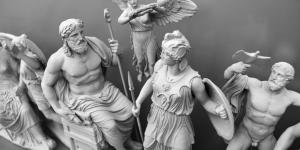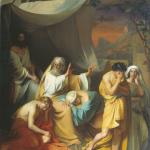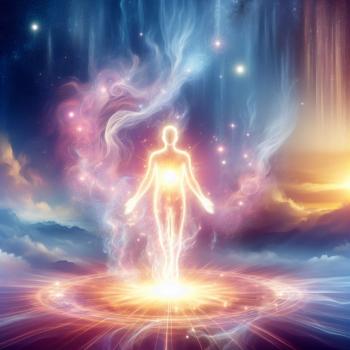It has long been a theological and metaphysical bone of contention as to whether there is only one, literal God, or whether there are many gods, One of whom is simply the greatest among them. In other words, is there numerically just “one” God, or is there a number of gods organized in a type of hierarchy with only one on top?
Some have argued that if the former is the case, then in the Torah, Moses was teaching an “absolute” monotheism: there exists one, literal God, and only one God. If the latter, Moses was not teaching an absolute monotheism, where only one God exists, but that there is only one God who exists who is worthy of worship. This view is often known by its technical name: monolatry, the worship of only one God. The God in question is, of course, Yahweh. However, if Moses is teaching monolatry, only Yahweh is worthy of worship, that still affirms the existence of other ‘gods,’ even if these other gods are not worthy in the same way Yahweh is.
So, which is it? Do many gods exist, One of whom, Yahweh, is worthy of being worshipped? Or does only one God exist, which, by logical entailment, means only one God can actually be worshipped?
Deuteronomy Chapter 4: A Biblical “Mega” Passage
Some parts of the Old Testament are hard to get through, admittedly. Just crack open 1 Chronicles and start reading, you’ll get the picture. However, while I would say no part of the Old Testament is unimportant, to include 1 Chronicles 1-9 (seriously, read it!), some are clearly more theologically significant, and more historically gripping, than others. Deuteronomy Chapter 4 is, in these senses, a “mega” passage of the Bible. As Jefferey Tigay puts it:
Chapter 4 is the theological heart of Deuteronomy, explaining its most fundamental precepts, monotheism and the prohibition of idolatry.
From the truth about the ontological nature of God and the ontological nature of other “gods” or idols, all other aspects of Israelite religion and the Mosaic law flow. If one does not get God right, then the cultic, the social, and the moral laws of Moses are meaningless. As Tigay points out, there are other, subservient reasons to observe the law, but if one does not know the primary reason, the nature and will of the one, true God, the other reasons become trivial:
[Moses] advances various types of arguments for observance: history teaches the utility of observance; the laws are just; they secure God’s closeness; they make Israel unique; observance will earn the admiration of others; the laws have logical reasons; they are the will of the only true God and a prerequisite for well-being.
The last two reasons: “the will of the only true God” and “the prerequisite for well-being” are fundamental, and fundamentally connected. Because these laws are willed by “the only true God” they are the ones that will bring well-being. But again, who is the one, true God, and is He the only god?
Deuteronomy 4 has more to say about this: quite a bit in fact. Moses begins recounting an incident of idolatry of some other god (Baal) at Baal-Peor (Num 25). This didn’t turn out well, ending in the destruction of those idolatrizing. Moreover, in this passage, God assures his people that if they avoid worshipping other gods, then this will not only not happen to them, but that his people will enjoy a special nearness, a relational intimacy, with God that other nations do not have with their gods:
3 You have seen for yourselves what the Lord did with regard to the Baal of Peor, how the Lord your God destroyed from among you everyone who followed the Baal of Peor, 4 while those of you who held fast to the Lord your God are all alive today.
5 “See, just as the Lord my God has charged me, I now teach you statutes and ordinances for you to observe in the land that you are about to enter and occupy. 6 You must observe them and perform them, for this will show your wisdom and discernment to the peoples, who, when they hear all these statutes, will say, ‘Surely this great nation is a wise and discerning people!’ 7 For what other great nation has a god so near to it as the Lord our God is whenever we call to him? 8 And what other great nation has statutes and ordinances as just as this entire law that I am setting before you today?
However, nothing in this passage suggests that the gods of other nations do not exist, to include Baal. Moses seems to be suggesting in fact they do exist, but, if anything, that they are aloof and distant from those who worship them. In other words, they don’t care about their people in the way Yahweh does for his.
The next several verses, from vv. 9-31, give an extended account of Yahweh’s acts in Israel’s history, and why only He is worthy of worship. There are two specific warnings that Moses gives to the people regarding idolatry, both of which tell us something more about the nature of other gods:
Here he [Moses] warns against two aspects of idolatry that might mistakenly be considered acceptable, making image of the Lord–violating the second commandment–and worshipping members of His retinue.
Tigay, 46
The first warning, which relates to the second commandment about not making graven images, does not weigh too heavily in our estimation of the existence of other gods. This has to do with not making physical images of Yahweh, who, being pure Spirit, has no form. As such, any material representation of Yahweh inevitably misrepresents God. This is why some feminist scholars have argued against the appropriateness of thinking of Yahweh in masculine terms, since God is obviously not gendered (although, we should say in response, it is not insignificant that God chooses to be called predominately by the masculine terms). This injunction against representations is found in verses 15-18:
“Since you saw no form when the Lord spoke to you at Horeb out of the fire, watch yourselves closely, 16 so that you do not act corruptly by making an idol for yourselves in the form of any figure: the likeness of male or female, 17 the likeness of any animal that is on the earth, the likeness of any winged bird that flies in the air, 18 the likeness of anything that creeps on the ground, the likeness of any fish that is in the water under the earth.
The second warning, however, is against worshipping celestial beings and “the host of heaven” or, as Tigay puts it, God’s “retinue.”
19 And when you look up to the heavens and see the sun, the moon, and the stars, all the host of heaven, do not be led astray and bow down to them and serve them, things that the Lord your God has allotted to all the peoples everywhere under heaven.
But what is this “host of heaven?” What is God’s retinue? Are they too “gods?”
Who, and What, Are The Other “Gods?”
Michael S. Heiser, before his death, worked incessantly to remind modern Christians whose hermeneutical lens had been warped by a scientistic, materialist culture that when the Bible speaks of other “gods” (Elohim in the Hebrew) we are to take those “gods” as not metaphorical, per se, but as substantial– or, in normal parlance, as real. While his seminal work, The Unseen Realm, is not before me to quote from, its main premise is simply stated: the gods of the Bible, the “host of heaven” are treated as actually existing beings in the pages of the Bible. At the same time, sometimes people did just worship the objects of nature, which, as we see in this passage, are different from the “host of heaven.” The “sun, the moon, and the stars” are not identical to “the host of heaven” even if they are part of the heavens.
There are two distinct ontological entities here: one set is that of physical objects of nature, the other of non-physical, or immaterial, creatures. Both, however, are glorious, and, being glorious, can deceive human beings into worshipping them as if they were God. The difference and the reasons for not worshipping either of these two types of creations was, however, laid bare by Maimonides:
The essential principle in the precepts concerning idolatry is that we are not to worship anything created–neither angel, sphere, star, none of the four elements, nor whatever has been formed from them….The verse means that when your mind roams and you observe that the world is guided by these spheres and that God placed them in the world, as beings that live, endure permanently, and do not disintegrate like all other things, you might say that it is proper to bow down to these spheres, and worship them. Concerning this tendency, God commanded…that is to say, do not be led astray by the fancies of your mind, to worship these beings as intermediaries between yourselves and the Creator.
Maimonides, quoted in Tigay, 50
Maimonides mixes here two kinds of beings in his list: putting angels and stars together, for example. The only significant difference in our outlook today, from Maimonides’ 12th-century perspective, is that we know that stars and such are not themselves “eternal” nor do they endure “permanently.” In that sense, given our scientific knowledge of physical objects, such celestial beings and other natural objects may not attract our devotion as much as they once did. One would think, if anything, that the contingency of these most wondrous objects of nature would lead to the proper recognition of the Being that created them.
However, there are other created things that might still attract us, things not limited to our own selves, and that are qualitatively different from their co-created cousins. That qualitative difference is significant, because if there are other elohim, like angels or demons, they are personal beings. And, if personal, then they may very well have something like wills, free wills even. And if they have free wills, then they may also have moral agency. And, if moral agency, they may be either good and holy creatures, or evil and malevolent ones.

A Word about Idols
Most ancient pagans did not believe that the idol itself was alive: the “idol’ here meaning the actual stone, wood or metal figure or statue representing the god. The idol, the physical symbol of the god, was meant to attract the deity, to draw the immaterial, personal, agentive creature into the presence of the worshippers. This was yet another reason for the prohibition against images of Yahweh, for not only would any image distort His true nature (which He wants us to know), but because Yahweh, being the Creator, does not respond to mere artifices of man. His will cannot be manipulated, as perhaps the wills of lesser gods can be, nor is His will malevolent, wanting to present Himself as something He is not–namely, physical.
However, some pagans did believe that the gods just were the physical images themselves:
Idolaters–certainly the more educated ones–did not think that the statue was the deity. They believed that the god was not present in the statue before the quickening ceremony [i.e., magical ritual] and that it might abandon the statue as will. But the distinction between statue and deity was easily overlooked, and idolaters sometimes considered images as identical to the deity or possessing powers of their own–in other words, as fetishes.
Tigay, 53
“Fetishes” in this context, unlike in its modern, psychoanalytic one, are related to objects one considers to have innate causal powers, or, “agency.” This is the most rudimentary, most barbaric, and most irrational of all beliefs. However, even modern-day people can fall into this trap of worshipping actual objects as if the objects themselves were somehow divine. There is an entire industry surrounding crystals, or certain metals, that proves this point. It is against this kind of absurd fetishism that would motivate later prophets, like Jeremiah, to mockery of both the idols and their makers:
For the customs of the peoples are false:
a tree from the forest is cut down
and worked with an ax by the hands of an artisan;
4 they deck it with silver and gold;
they fasten it with hammers and nails
so that it cannot move.
5 Their idols[a] are like scarecrows in a cucumber field,
and they cannot speak;
they have to be carried,
for they cannot walk.
Do not be afraid of them,
for they cannot do evil,
nor is it in them to do good….Everyone is stupid and without knowledge;
goldsmiths are all put to shame by their idols,
for their images are false,
and there is no breath in them.
15 They are worthless, a work of delusion;
at the time of their punishment they shall perish.
Conclusion: Many Immaterial Beings, Only One Immaterial God
To sum up the salient, ontological points: many things exist that the Bible sometimes refers to as “Elohim,” which can be translated as “god,” and which is a term often used for Yahweh. However, not all “Elohim” are transcendent, uncreated, all-powerful, all-benevolent, and eternal. There is only one Elohim, Yahweh, who is that (and more, as we come to find out after the Resurrection of Jesus Christ). Further, it is this Elohim, Yahweh, who actually acts on behalf of His people:
32 “For ask now about former ages, long before your own, ever since the day that God created human beings on the earth; ask from one end of heaven to the other: Has anything so great as this ever happened, or has its like ever been heard of? 33 Has any people ever heard the voice of a god speaking out of a fire, as you have heard, and lived? 34 Or has any god ever attempted to go and take a nation for himself from the midst of another nation, by trials, by signs and wonders, by war, by a mighty hand and an outstretched arm, and by terrifying displays of power, as the Lord your God did for you in Egypt before your very eyes?
And, it is because Yahweh acts on behalf of those He loves, that we know He is the one, true God:
35 To you it was shown so that you would acknowledge that the Lord is God; there is no other besides him.
Tigay summarizes the heart of Deuteronomy’s message:
These texts do not argue that other beings called gods do not exist. As noted…the words ‘el and ‘Elohim were sometimes used for various types of supernatural beings and for idols, and the Bible does not deny the existence of such beings or of images. What is denied is that they are really gods.
Tigay, 55
These other immaterial, personal creatures are not gods, because they are not really divine. They are not independent, effective divine power (Tigay, 434) but finite, derivative and contingent creatures with limited powers, limited by Yahweh, and perhaps even by human beings. And so, to answer the titular question, we might say: there are many beings that are called “gods” but that are not really gods in the true sense. In the true sense, there is only one Being, Yahweh, who is God, and, as such, Monotheism is the proper term for both the Jewish and Christian religions.
Finally, as to the image of God, we only come to realize why the second commandment was so crucial upon the incarnation of Jesus Christ. Paul, summarizing an early creed of the Church, tells us something quite profound about this image in his letter to believers in Colossae:
15 He [Jesus Christ] is the image of the invisible God, the firstborn of all creation, 16 for in[i] him all things in heaven and on earth were created, things visible and invisible, whether thrones or dominions or rulers or powers—all things have been created through him and for him. 17 He himself is before all things, and in[j] him all things hold together. 18 He is the head of the body, the church; he is the beginning, the firstborn from the dead, so that he might come to have first place in everything. 19 For in him all the fullness of God[k] was pleased to dwell, 20 and through him God was pleased to reconcile to himself all things, whether on earth or in heaven, by making peace through the blood of his cross.














